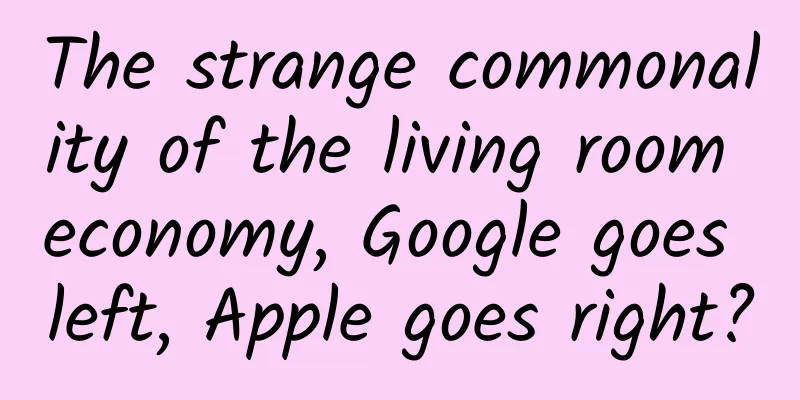The strange commonality of the living room economy, Google goes left, Apple goes right?

|
The living room is one of the places where family members live and spend the longest time. It is a huge entrance to future family life and entertainment, and is being attacked by global giants with new technologies, new terminals, and new content. In fact, before this new living room economic battle took place, in the 1980s, Japan's Sony, Panasonic, and British Telecom had already launched an attack on the home entertainment market, and developed black-and-white TVs, color TVs, and TV terminals that provided users with voice, fast transmission of graphics, fax, and slow scanning. In this battle for home entertainment entry, famous electronics companies such as Sony, Panasonic, and Toshiba were born in Japan. The Japanese electronics industry also rose strongly worldwide, and Japan became synonymous with high-quality electronic technology. So far, family members around the world have experienced the baptism of three screens: PC, tablet computer and smart phone. In the era of mobile Internet, the value of smart phones has been fully released by giants. In this wave of mobile Internet set off by smart phones, Apple has created the iPhone smart phone to change and shake the world. Jobs not only became a giant in the history of world science and technology, but also injected product experience, industrial design, and technological ecology that touched the soul of users into the technology world, and became a shining star that was worshipped and subverted by everyone. Facts have proved that every time technology innovates and upgrades human beings, the creators not only become the focus of the world, but also create a lot of wealth. The era creates heroes, which is particularly obvious in the technology world. Sony and Panasonic occupied the throne of the color TV era, while Samsung and Apple dominated the subversion of the smartphone era. Between the former and the latter is the rapid iteration of Internet technology, which changes and upgrades users' vision, touch, new experience and thinking mode. When technology giants, forged by Internet technology, once again return to define the living room economy, huge changes have already occurred. Chasing current earnings expectations, Apple and Microsoft move to the right At present, the consensus reached on the controversy of the living room economy is that smart TVs are not the only entrance to the living room economy. This consensus has led to the differentiated understanding and product layout of Google, Amazon, Apple and Microsoft on the living room economy. The judgments made by these four giants on the living room economy have also become a sample of the layout of the global technology industry on the living room economy. Apple TV The accumulation and extension of product genes are reflected in the layout of Apple and Microsoft for the living room economy. Both Apple and Microsoft have experienced the golden age of PCs, and the inherent thinking is that PC = mouse + keyboard + monitor + operating system. For the entrance to the living room economy, Apple and Microsoft have a wonderful commonality: both parties have invested heavily in the software developer ecosystem, and developers have become adept at improving the functions of any device with a display. In this regard, I think: "Apple and Microsoft have gained huge commercial benefits in system development. Microsoft's Windows helped Bill Gates become the world's richest man, and Apple's closed model of hardware + ecosystem has successfully pushed Apple to subversion." Microsoft Xbox One In order to extend its product genes, Apple's layout for the living room economy was to launch Apple TV and start supporting Apple TV. In the future, Apple TV will soon be upgraded to become a smart home assistant supported by personal voice assistant Siri; Microsoft has upgraded its Xbox One game console to allow it to run the Windows 10 operating system, unleashing the value potential of Microsoft in the operating system. At the same time, regarding the intelligent trend of living room terminal devices, Microsoft CEO Satya Nadella has said that the company's Xbox One game console will also have similar functions, and the personal intelligent assistant Cortana will be integrated in the upcoming upgrade program. Smart TVs and game consoles, two terminals that were originally incomparable, have only become different in appearance after being endowed with a core of intelligence, interconnection, and ecology by technology. In the ecosystem of game consoles, shopping, social networking, payment, live broadcast, video and other functions similar to those of smart TVs have long appeared. As for the TV, the inventor John Logie Baird could never have imagined the subversion of the TV by later generations. Perhaps, what can be retained at present is only the original memory of the appearance of the TV. The same understanding of home interactive entertainment occurs not only in the United States, but also in Japan and China. It is a consensus among giants. Most people believe that there is no right or wrong between the two. Apple and Microsoft's layout for the living room economy is very limited in terms of imagination. The products are also based on the extension of early genes, but they are very down-to-earth and can produce huge commercial value without the need for market cultivation and education. I think this is also one of the judgment bases for Apple and Microsoft's layout of the living room economy. Focusing on future intelligent exploration, Google and Amazon move left Neither Google nor Amazon has very strong hardware genes. Both are giants born after the PC became increasingly sophisticated and the Internet was formed. The impact of the Internet on both is far greater than that of computers. This is also how Google and Amazon occupy the living room to differentiate themselves from Apple and Microsoft. This differentiation is caused by the characteristics of the Internet. Currently, Amazon and Google have launched Echo and Google Home smart speakers respectively. Unlike TVs and game consoles, these smart home devices are always on standby and can be placed anywhere with a power socket. Amazon has even started selling mini Echo smart speakers, allowing you to place one in every room. It can be seen that Amazon and Google are using their signature skills - Internet services and artificial intelligence - to influence the entrance to family interaction, but they do not care whether the living room economy is screen-based. Google Home smart speaker Amazon Echo smart speaker Google and Amazon's layout of the living room economy is exploratory worldwide. After the smart speaker is embedded with network services and artificial intelligence, the speaker is just a terminal form. For a long time, speakers have not been the leading product for TVs, which have been used as a visual medium for users' living room entertainment. After giving speakers network services and artificial intelligence, can they subvert the needs of family members for living room entertainment? Just like the wonderful commonality between smart TVs and game consoles, speakers are just a form, and the core of intelligence, interconnection, and ecology is the key, and there is no right or wrong in this either. Currently, the terminals that dominate the living room economy around the world include smart TVs, game consoles, and smart speakers. As an early leader in home entertainment, Sony has adopted a dual-line layout of smart TV + game console. Domestic LeTV, Xiaomi, and traditional home appliance giants pay more attention to the Internet and intelligent upgrade of smart TV. Data shows that in 2012, the market penetration rate of smart TV in China was only 19%; in 2015, its penetration rate reached 86%. The hardware and derived service value created by the entire living room economy in my country is 230 billion yuan; by 2020, the overall scale of the living room economy may reach 1.1 trillion yuan. For the giants, when they fight freely in the economic layout of the living room without right or wrong, they show their wonderful commonalities. As a winner of Toutiao's Qingyun Plan and Baijiahao's Bai+ Plan, the 2019 Baidu Digital Author of the Year, the Baijiahao's Most Popular Author in the Technology Field, the 2019 Sogou Technology and Culture Author, and the 2021 Baijiahao Quarterly Influential Creator, he has won many awards, including the 2013 Sohu Best Industry Media Person, the 2015 China New Media Entrepreneurship Competition Beijing Third Place, the 2015 Guangmang Experience Award, the 2015 China New Media Entrepreneurship Competition Finals Third Place, and the 2018 Baidu Dynamic Annual Powerful Celebrity. |
<<: The basic logic of Youpengpule's entry into the children's content market
Recommend
How to write a new product development plan?
First of all, we must understand that everything ...
Zhangye WeChat ordering software mini program, how much does the catering WeChat mini program cost?
Everyone is familiar with WeChat mini-programs . ...
How much does it cost to make a lighting app in Neijiang?
Neijiang lamps applet production price 1. Display...
How can educational institutions prepare good plans for Double 12 activities?
Double Eleven has just passed and Double Twelve i...
The world's largest new crown vaccine production workshop is built in China! Where exactly is it? When will it be put into use? Details attached!
Recently, the epidemic situation in various count...
It's settled! This thing that caused the Internet to crash will be cancelled in 2035!
Leap seconds will soon be history. In the current...
What is the difference between canned Wangzai and boxed Wangzai? Nutritionist: There is a big difference, don't buy the wrong one
Wangzai, both adults and children love it. After ...
The advertising and marketing of this World Cup has been wildly criticized by netizens. Are the brands teaming up to commit suicide?
In this super hot spot, various event-related rep...
Hejun "Zeng Qiao's Capital Observation" Season 5
Supported by a 30-person research team, each sess...
"Pouring water to make ice" makes the winter atmosphere full, be careful not to get hurt
The recent cold wave sweeping across the country ...
Is financing too difficult? NIO CFO Xie Dongying resigns
Recently, NIO issued an announcement stating that...
History of Wenchang Tower
Wenchang Pagoda, also known as Wenbi Pagoda, Wenf...
The "Jiuxiao Huanpei" Qin collected by the National Museum of China (Part 1)
The "Jiuxiao Huanpei" Qin collected by ...
How do we survive the winter when the temperature is -53℃? Mohe residents: We wear short sleeves in the house!
Mohe, Heilongjiang Extremely cold weather continu...
Android QQ 8.7.0 released: Little yellow face ejects you across the screen
[[396715]] Tencent today released the latest offi...









